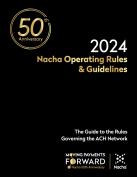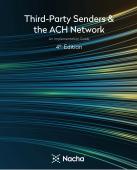Differentiating Unauthorized Return Reasons
This rule better differentiates among types of unauthorized return reasons for consumer debits. This differentiation will give ODFIs and their Originators clearer and better information when a customer claims that an error occurred with an authorized payment, as opposed to when a customer claims there was no authorization for a payment. ODFIs and their Originators should be able to react differently to claims of errors, and potentially could avoid taking more significant action with respect to such claims.
"Not sure how to calculate the Unauthorized Return Rate?" Download this resource
Details
The rule re-purposes an existing, little-used return reason code (R11) that will be used when a receiving customer claims that there was an error with an otherwise authorized payment. Previously, return reason code R10 was used a catch-all for various types of underlying unauthorized return reasons, including some for which a valid authorization exists, such as a debit on the wrong date or for the wrong amount. In these types of cases, a return of the debit still should be made, but the Originator and its customer (the Receiver) might both benefit from a correction of the error rather than the termination of the origination authorization. The use of a distinct return reason code (R11) enables a return that conveys this new meaning of “error” rather than “no authorization.”
Effective date: Phase 1 – April 1, 2020; effective date Phase 2 – April 1, 2021.
Effective Dates
The rule becomes effective in two phases. On April 1, 2020, the re-purposed return code became effective, and financial institutions will use it for its new purpose. Other provisions in the rules that apply to unauthorized returns became effective at this time with respect to R11s – i.e., Unauthorized Entry Return Rate and its relationship to ODFI Return Rate Reporting obligations.
On April 1, 2021, the re-purposed R11 return code becomes covered by the existing Unauthorized Entry Fee. This part of the rule will be implemented by the ACH Operators, and as with the current fee, is billed/credited on their monthly statements of charges.
As noted in ACH Operations Bulletin #4-2020, RDFIs that are not ready to use R11 as of April 1, 2020 should continue to use R10. RDFIs should implement R11 as soon as possible.
Technical
Return Reason Code R10 is now defined as “Customer Advises Originator is Not Known to Receiver and/or Originator is Not Authorized by Receiver to Debit Receiver’s Account” and used for:
-
Receiver does not know the identity of the Originator
-
Receiver has no relationship with the Originator
-
Receiver has not authorized the Originator to debit the account
-
For ARC and BOC entries, the signature on the source document is not authentic or authorized
-
For POP entries, the signature on the written authorization is not authentic or authorized
Return Reason Code R11 is now defined as “Customer Advises Entry Not in Accordance with the Terms of the Authorization.” It will be used by the RDFI to return an entry for which the Originator and Receiver have a relationship, and an authorization to debit exists, but there is an error or defect in the payment such that the entry does not conform to the terms of the authorization. This includes:
-
The debit Entry is for an incorrect amount
-
The debit Entry was debited earlier than authorized
-
The debit Entry is part of an Incomplete Transaction
-
The debit Entry was improperly reinitiated
-
For ARC, BOC, or POP entries:
-
The source document was ineligible
-
Notice was not provided to the Receiver
-
The amount of the entry was not accurately obtained from the source document
-
R11 returns will have many of the same requirements and characteristics as an R10 return, and be considered unauthorized under the Rules
-
Incorrect EFTs are subject to the same error resolution procedures under Regulation E as unauthorized EFTs
-
RDFIs’ effort to handle the customer claim and obtain a WSUD remain the same as with the current obligations for R10 returns
-
The RDFI will be required to obtain the Receiver’s Written Statement of Unauthorized Debit
-
The return timeframe is 60 days
-
R11 returns will be included within the definition of Unauthorized Entry Return Rate
-
R11 returns will be covered by the existing Unauthorized Entry Fee
-
The new definition and use of R11 does not include disputes about goods and services, just as with the current definition and use of R10
A key difference between R10 and R11 is that with an R11 return an Originator is permitted to correct the underlying error, if possible, and submit a new Entry without being required to obtain a new authorization.
-
The new Entry must be Originated within 60 days of the Settlement Date of the R11 Return Entry
-
Any new Entry for which the underlying error is corrected is subject to the same ODFI warranties and indemnification made in Section 2.4 (i.e., the ODFI warrants that the corrected new Entry is authorized)
Organizational changes have been made to language on RDFI re-credit obligations and written statements to align with revised return reasons, and to help clarify uses
-
No changes to substance or intent of these rules other than new R10/R11 definitions
-
Section 3.12 Written Statement of Unauthorized Debit
-
Relocates introductory language regarding an RDFI’s obligation to accept a WSUD from a Receiver
-
Subsection 3.12.1 Unauthorized Debit Entry/Authorization for Debit Has Been Revoked
-
Includes invalid/inauthentic signatures for check conversion entries within description of an unauthorized debit;
-
Removes references to amount different than or settlement earlier than authorized
-
Includes "authorization revoked" (Note: continues to use return reason code R07)
-
-
Subsection 3.12.2 Debit Entry Not in Accordance with the Terms of the Authorization
-
Describes instances in which authorization terms are not met
-
Incorporates most existing language regarding improper ARC/BOC/POP entries; incomplete transactions; and improperly reiniated debits
-
Incorporates language related to amounts different than or initiated for settlement earlier than authorized
-
-
Subsection 3.12.3 – Retains separate grouping of return situations involving improperly-originated RCK entries that use R51
-
Renumbering of other subsections
-
Corrects a reference regarding RDFI’s obligation to provide copy of WSUD to “Settlement Date” rather than date of initiation
-
-
Section 3.11 RDFI Obligation to Re-credit Receiver
-
Syncs language regarding an RDFI’s obligation to re-credit with re-organized language of Section 3.12
-
Replaces individual references to incomplete transaction, improper ARC/BOC/ POP, and improperly reinitiated debit with a more inclusive, but general, term “not in accordance with the terms of the authorization”
-
-
Section 8.117 Written Statement of Unauthorized Debit definition
-
Syncs language regarding the use of a WSUD with new wording of Section 3.12
-
Effective date: Phase 1 – April 1, 2020; effective date Phase 2 – April 1, 2021
As noted in ACH Operations Bulletin #4-2020, RDFIs that are not ready to use R11 as of April 1, 2020 should continue to use R10. RDFIs should implement R11 as soon as possible.
Impact
Expected benefits
-
Provides more granular and precise reasons for returns
-
ODFIs and Originators will have clearer information in instances in which a customer alleges “error” as opposed to “no authorization”
-
Corrective action is easier to take in instances in which the underlying problem is an error (e.g., wrong date, wrong amount)
-
More significant action can be avoided when the underlying problem is an error (e.g., obtaining a new authorization, or closing an account)
-
-
Allows collection of better industry data on types of unauthorized return activity
Potential impacts
-
ACH Operator and financial institution changes to re-purpose an existing R-code, including modifications to return reporting and tracking capabilities
-
RDFI education on proper use of return reason codes
-
Education, monitoring and remediation by Originators/ODFIs
-
Change in a 2-day return timeframe for R11 to a 60-day return timeframe; this could include system changes
-
Inclusion of an additional return code within existing rules on ODFI Return Reporting and Unauthorized Entry Fees
As noted in ACH Operations Bulletin #4-2020, RDFIs that are not ready to use R11 as of April 1, 2020 should continue to use R10. RDFIs should implement R11 as soon as possible.
FAQs Section
Why was this change made?
Return reason code R10 has been used as a catch-all for various types of underlying unauthorized return reasons, including some for which a valid authorization exists, such as a debit on the wrong date or for the wrong amount. In these types of cases, a return of the debit still should be made, but the Originator and its customer (the Receiver) might both benefit from a correction of the error rather than the termination of the origination authorization. The use of a distinct return reason code (R11) enables a return that conveys this new meaning of “error” rather than “no authorization.”
Under the rule, how will R10 be defined?
R10 is defined as “Customer Advises Originator is Not Known to Receiver and/or Originator is Not Authorized by Receiver to Debit Receiver’s Account” and will be used for:
-
Receiver does not know the identity of the Originator
-
Receiver has no relationship with the Originator
-
Receiver has not authorized the Originator to debit the account
-
For ARC and BOC entries, the signature on the source document is not authentic, valid, or authorized
-
For POP entries, the signature on the written authorization is not authentic, valid, or authorized
Under the rule, how will R11 be defined?
R11 is defined as “Customer Advises Entry Not in Accordance with the Terms of the Authorization.” It will be used by the RDFI to return an entry for which the Originator and Receiver have a relationship, and an authorization to debit exists, but there is an error or defect in the payment such that the entry does not conform to the terms of the authorization. This will include:
- The debit Entry is for an amount different than authorized
- The debit Entry was initiated for settlement earlier than authorized
- The debit Entry is part of an Incomplete Transaction
- The debit Entry was improperly reinitiated
- For ARC, BOC, or POP entries:
-
- The source document was ineligible
- Notice was not provided to the Receiver
- The amount of the entry was not accurately obtained from the source document
-
What about entries that were previously being returned using R11?
R11 was currently defined to be used to return a check truncation entry. There have been no forward transactions under check truncation entry programs since 2014.
Will R10 and R11 still be used only for consumer Receivers?
-
R10 and R11 will both be used for consumer Receivers or for consumer SEC Codes to non-consumer accounts
-
R29 will continue to be used for CCD & CTX to non-consumer accounts
What requirements will apply to R11?
R11 returns will have many of the same requirements and characteristics as an R10 return, and are still considered unauthorized under the Rules
- Incorrect EFTs are subject to the same error resolution procedures under Regulation E as unauthorized EFTs
- RDFIs’ effort to handle the customer claim and obtain a WSUD remain the same as with the current obligations for R10 returns
- The RDFI will be required to obtain the Receiver’s Written Statement of Unauthorized Debit
- The return timeframe is 60 days
- R11 returns will be included within the definition of Unauthorized Entry Return Rate
- R11 returns will be covered by the existing Unauthorized Entry Fee
- The new definition and use of R11 does not include disputes about goods and services, just as with the current definition and use of R10
What follow-up actions can an Originator take after receiving an R11 return?
An Originator that has received an R11 return may correct the error or defect in the original Entry, if possible, and Transmit a new Entry that conforms to the terms of the original authorization, without the need for re-authorization by the Receiver.
- The new Entry must be Transmitted within 60 days from the Settlement Date of the Return Entry
- The new Entry will not be treated as a Reinitiated Entry if the error or defect in the previous Entry has been corrected to conform to the terms of the original authorization
- The ODFI warranties and indemnification in Section 2.4 apply to corrected new Entries
The rule permits an Originator to correct the underlying error that caused the claim of “error” for the return reason R11. What are examples of errors that can be corrected?
- Initiating an entry for settlement too early
- Debiting for the wrong amount
- A debit as part of an Incomplete Transaction
- An improper Reinitiated Entry
What are examples of errors that cannot be corrected after receipt of an R11 return?
- The Originator did not provide the required notice for ARC, BOC, or POP entries prior to accepting the check, or the notice did not conform to the requirements of the rules
- The source document for an ARC, BOC or POP Entry was ineligible for conversion
Can I use R11 to return an ARC, BOC, or POP entry where both the entry and the source document have been paid since this situation also involves an error or defect in the payment?
No. Since separate return reason codes already exist to address this particular situation, RDFIs should return these entries as R37 - Source Document Presented for Payment (60-day return with the Receiver’s signed or similarly authenticated WSUD) or R39 – Improper Source Document/Source Document Presented for Payment (2-day return used when the RDFI, rather than the consumer, identifies the error).
What is the effective date?
The rule will become effective in two phases. On April 1, 2020, the re-purposed R11 return code becomes effective, and financial institutions will use it for its new meaning. Other provisions in the rules that apply to unauthorized returns will become effective at this time with respect to R11s – i.e., Unauthorized Entry Return Rate and its relationship to ODFI Return Rate Reporting obligations.
On April 1, 2021, the re-purposed R11 return code becomes covered by the existing Unauthorized Entry Fee. This part of the rule will be implemented by the ACH Operators, and as with the current fee, is billed/credited on their monthly statements of charges.








